The Dx Future is Female: How Women in the Academe are Leading Digital Transformation in the Philippines
Honoring the exceptional women shaping the future of technology and innovation in the Philippines
8 March 2025 (Last Update: 17 March 2025) | Marianne Yzabelle P. Laron
DILIMAN, Quezon City — The Philippines ranked 3rd in the Eastern Asia and the Pacific region and the 25th globally in closing the gender gap, according to a World Economic Forum Report released last December 2024. Since 2006, the country has made the global top 10 in terms of gender parity score. Nonetheless, Filipino women continue to take up spaces and make strides in the economic, social, and political spheres.
In a nation where economic and technological landscapes are rapidly evolving, a remarkable roster of women is steering the course of digital transformation across the Philippines.
These innovators are the architects of the tech revolution, bringing new perspectives and solutions to fields ranging from healthcare to artificial intelligence. Their stories reflect a powerful convergence of expertise and leadership, as they navigate industries where women remain underrepresented.
As the Philippines continues its digital transformation journey, these women depict not just the current state of innovation but its brightest possible future, where technology serves human needs, bridges divides, and creates opportunities for all Filipinos.
To the Filipino women at the forefront of the country’s digital transformation — Happy National Women’s Month!
Radiology • Artificial Intelligence • Health Systems
Dr. Johanna Patricia dL. Adevoso-Cañal
Professor 12
Department of Radiology
UP College of Medicine
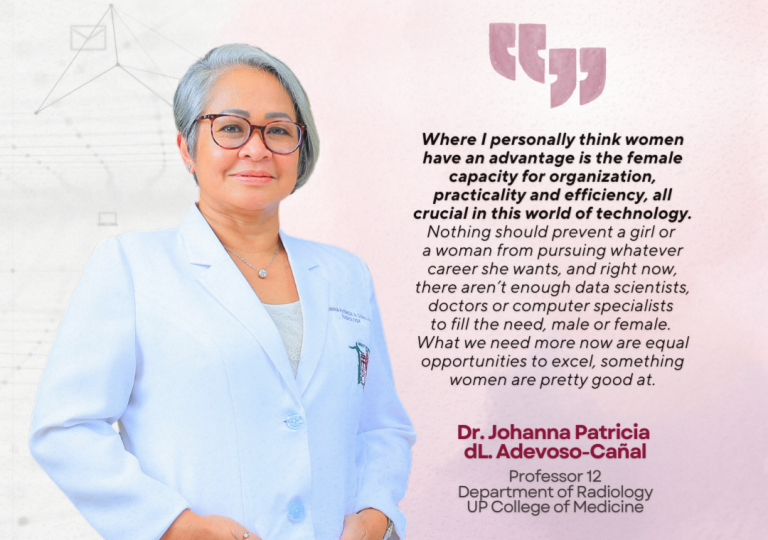
Dr. Johanna Patricia dL. Adevoso-Cañal is a renowned Filipino physician, educator, and administrator. With a distinguished academic background and extensive clinical experience, she has held key leadership positions in prestigious institutions such as the University of the Philippines, Asian Hospital and Medical Center, and UP-Philippine General Hospital. Dr. Cañal is a prolific researcher and has since authored over 45 papers. Her expertise in radiology, radiation oncology, and hospital administration has made significant contributions to the field of healthcare in the Philippines.
For Dr. Cañal, radiology is a world that is wholly amenable to digitalization. Radiologists and radiation oncologists are integral parts of automation and artificial intelligence (AI), making digitalization tailored to practitioners and the patients they serve. Dr. Cañal’s team of computer scientists and doctors has proven that digitalization can delineate tumors fairly accurately, make quicker work of contouring cancers on CT images, and provide faster diagnosis of prostate cancers on MRI. While there have been apprehensions on the use of AI in her field, Dr. Cañal’s experience showed that fighting technology would be self-defeating.
Education • Learning sciences • Virtual, augmented, and mixed reality
Dr. Maria Mercedes T. Rodrigo
Professor
Department of Information Systems and Computer Science
Ateneo de Manila University
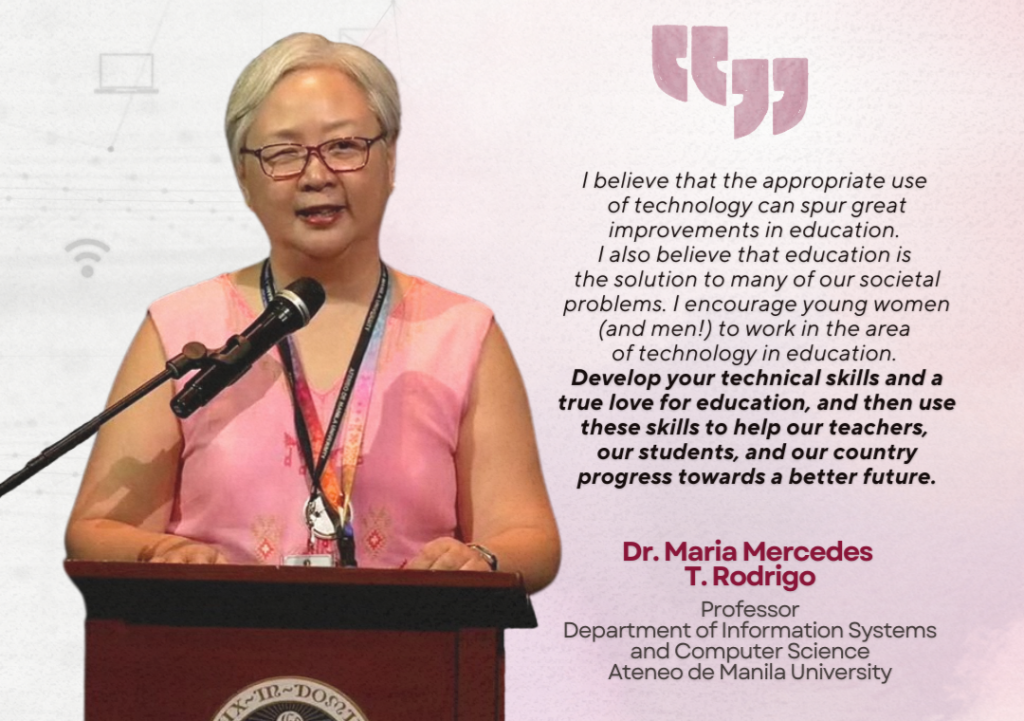
Dr. Maria Mercedes T. Rodrigo is the head of the Ateneo Laboratory for the Learning Sciences (ALLS) and the Ateneo Virtual, Augmented, and Mixed Realty (VAMR) Laboratory. ALLS creates and deploys computer-based learning materials for different school levels, while VAMR develops virtual, augmented, and mixed reality applications for informal learning. Both laboratories aim to digitally transform education through teacher assistance, data analysis, and the use of rich, computer-based learning experiences.
Technology in education brings together two of Dr. Rodrigo’s main interests: computer science and education. Dr. Rodrigo’s experiences tell her that three key challenges in advancing AI education in the Philippines remain: a small local AI community, rapid technological obsolescence, and the instability of technology integration in schools. To address these, she highlighted the value of collaboration, teacher support, and the continuous development of appropriate technologies. Their milestones in producing materials rooted in Filipino contexts (i.e., culture, history, tradition, and values) have helped her and their team realize how Filipino students learn best.
Data analytics • Applied mathematics • Public health
Dr. May Anne E. Mata
UP Scientist III
Research Director, Office of Research;
Mindanao Center for Disease Watch and Analytics
Professor
Department of Mathematics, Physics,
and Computer Science Division
Head for Complex Systems
UP Intelligent Systems Center
University of the Philippines Mindanao
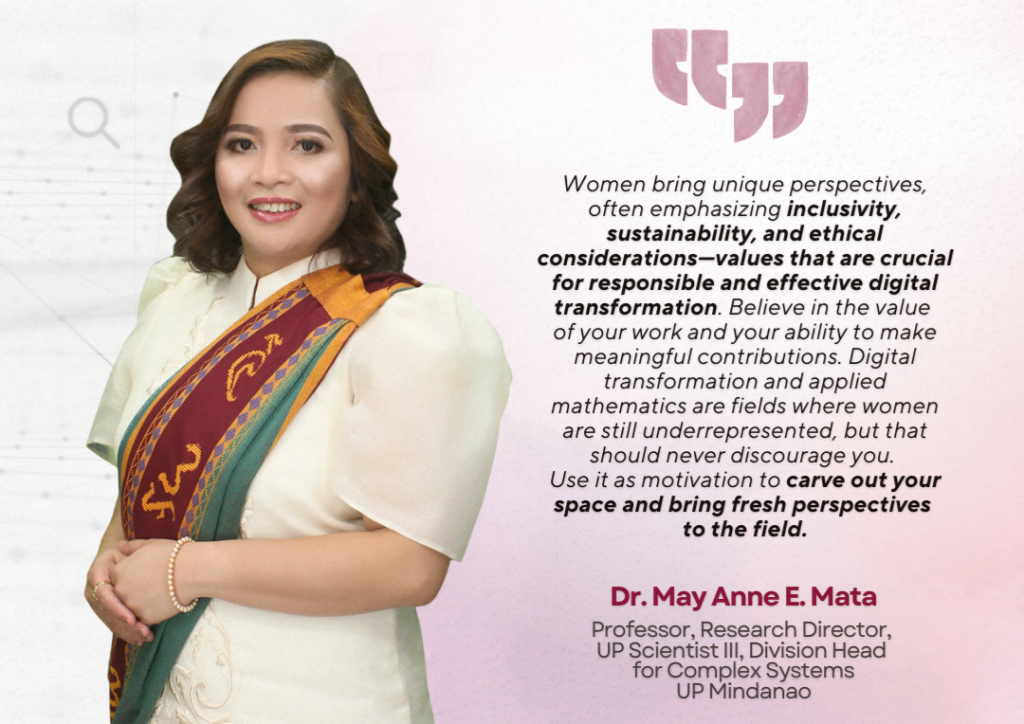
Dr. May Anne E. Mata is the prime mover and project leader of RabCast, a recognized DOST-PCHRD-funded project that developed a proof-of-concept rabies forecasting tool for Davao City. This laid the foundation for RabDash DC, a rabies data analytics dashboard integrating predictive models and genome informatics to support the City Veterinary Office. Beyond rabies research, Dr. Mata led the establishment of DiWA Center, Mindanao’s first disease data analytics hub, which aims to bridge research and policy-making in disease prevention.
Dr. Mata’s interest in digital transformation stemmed from her background in applied mathematics and her commitment to using data-driven approaches in practice. She saw how mathematical modeling, data analytics, and computational tools provided valuable insights for public health and for decision-makers. Among the biggest challenges she overcame were the initial hesitation from stakeholders and ensuring the user-friendliness and accessibility of digital solutions to non-specialists. These experiences reinforced Dr. Mata’s belief that building trust in digital tools was vital, and that technology should empower people and institutions, not replace them. Digital transformation should serve society, improve lives, and create more equitable opportunities. And for Dr. Mata, women have a critical role to play in this movement.
Engineering • Research • Technology development
Dr. Diana Marie R. De Silva
Associate Professor 1
Department of Industrial Engineering
University of the Philippines Los Baños
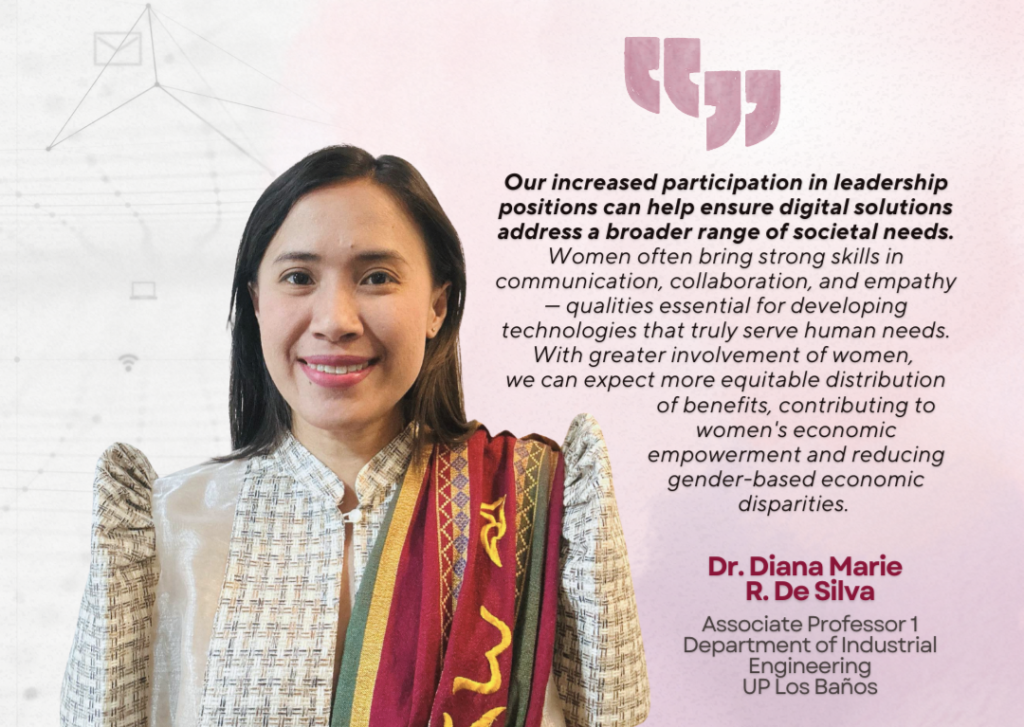
Dr. Diana Marie R. De Silva earned her PhD in Business Economics at KU Leuven, Belgium, and PhD in Management Engineering at Università degli Studi di Padova, Italy. She has worked on multiple government-funded and university-funded research projects, such as the Digitized Open Innovation Network for Inclusive Growth (DOING), SPACE, and PAIR-UP of the University Partnership with Industries and Communities to Hone Innovation and Participation (UP CHIP) Program.
Dr. De Silva’s craft centers on developing platforms that bridge resource gaps between organizations and individuals, fostering collaborative virtual communities. She recognizes that digital transformation can address the human challenge of handling diverse data for informed decisions. While automation seems simple, successful implementation demands technical mastery and strategic leadership built through experience and patience. This is an area where women can contribute their unique perspectives and inclusive problem-solving approaches.
Organizational leadership • Network infrastructure • Business management
Asst. Prof. Rhea J. Subong-Espina
Director
Digital Innovation Center
University of the Philippines Visayas
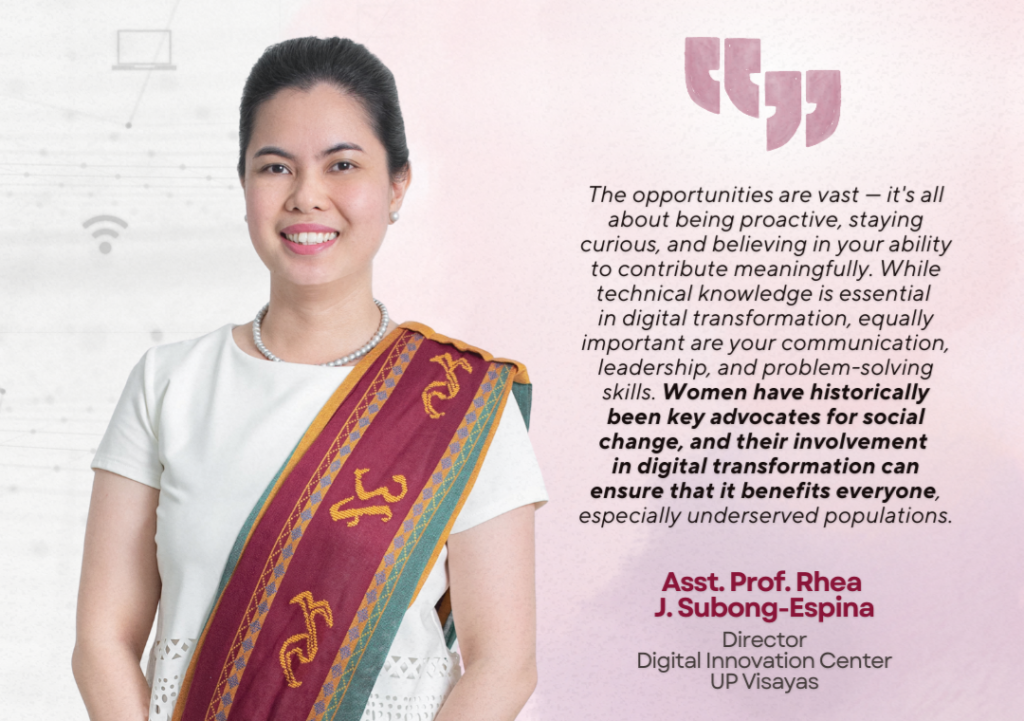
Asst. Prof. Rhea J. Subong-Espina, as the Director of the Digital Innovation Center of the University of the Philippines Visayas, leads the digital transformation initiatives of the University. One of the digital transformation projects their team initiated is the UP Visayas Network Infrastructure: One UPV Campuses and Research Facilities worth PhP 63 million. The project shall upgrade the existing fiber optic network in the UPV Miagao and Iloilo City campuses, install fiber optic network in its extension campus, and provide internet connectivity in its off-site research facilities situated in Guimaras, Aklan, and Iloilo.
Asst. Prof. Subong-Espina’s interest in digital transformation grew from the realization of how rapidly technology was changing the way businesses and organizations operate. Digital transformation is about reshaping models, workflows, and cultures. This came with certain challenges like legacy system integration, capacity development, data security and privacy concerns. Her experience showed that navigating digital transformation requires robust strategic planning, unwavering resolve, and a steadfast commitment to objectives.
Computer science • Agriculture • Artificial intelligence
Dr. Armacheska M. Satina
Faculty, Department of Computer Science and Mathematics
Director, Information Technology Office
UP Mindanao
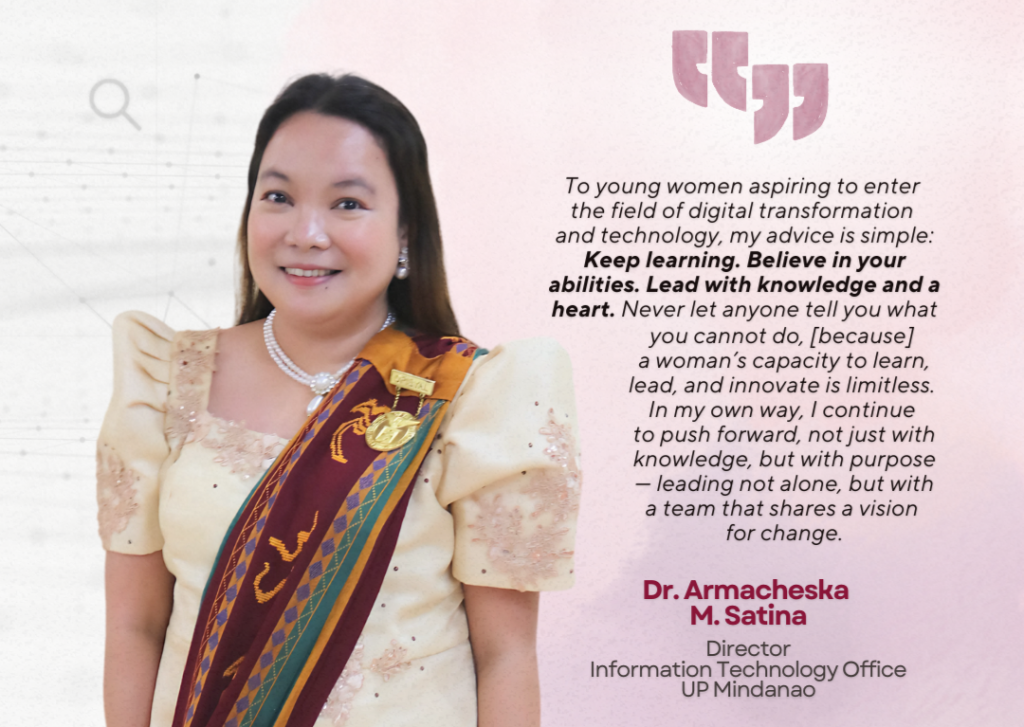
Dr. Armacheska M. Satina earned her Master of Information Systems from the UP Open University and her PhD in Computer Science under Image Processing Laboratory from the National Sun Yat-sen University. Seeing Taiwan’s advancements in smart agriculture and digital infrastructure further inspired her to help bring the Philippines closer to that level of technological growth. She led a team in building what is now known as the Intelligent System for Internal Processes (ISIP)—a digital platform designed to redefine university operations management. Her passion for digital transformation extends to the agricultural sector, as she spearheaded AIDurian (AI-based Non-Invasive Grading for Durian) and Project DALISAI (Durian Dashboard and Analytics Leveraging IoT Systems and AI). These projects employ drone technology, IoT sensors, and AI to provide real-time insights into farm conditions, maximizing yield and quality.
As a woman in a male-dominated field, Dr. Satina encountered skepticism and resistance, questioning her leadership and capabilities. But her work and commitment in making a difference shattered doubts. Through team-driven innovations, she proved that transformation is not just about who leads, but about how well a team works together toward a shared vision.
Civil engineering • Transportation • Artificial intelligence
Dr. Lea B. Bronuela-Ambrocio
Assistant Professor
Institute of Civil Engineering
College of Engineering
University of the Philippines Diliman
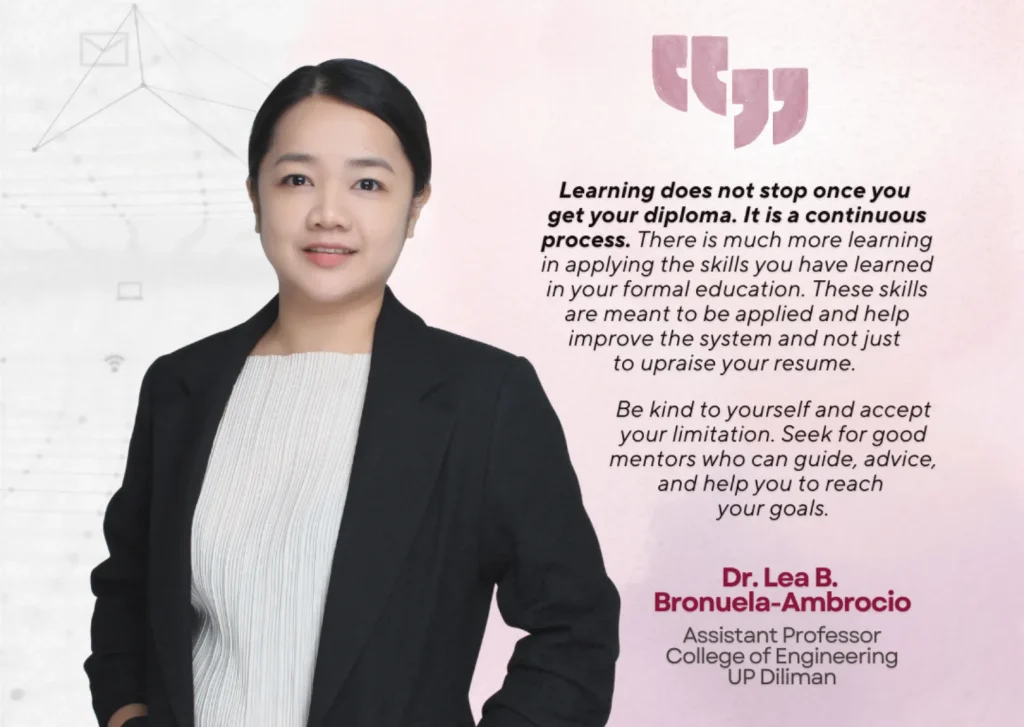
Dr. Lea B. Bronuela-Ambrocio earned her Integrated MS-PhD in Engineering, Traffic, and Highway Engineering from Chung-Ang University, Seoul Korea. Her projects and published papers specialize in the integration of advanced digital technologies, such as 3D modeling, sensors, and artificial intelligence (AI), into pavement analysis and maintenance. Dr. Bronuela-Ambrocio’s latest project involves the application of AI to identify road surface defects, aiming to enhance efficiency and reduce surveyors’ exposure to extreme weather conditions and other job hazards.
Significant developments are seen and initiatives are pursued to bridge gender gaps across various disciplines. However, much work can still be done in breaking gender norms, especially in the pavement engineering field. Further studies on pavement engineering, for example, entail laboratory and field tests that require the conventional physical attributes of men. For Dr. Bronuela-Ambrocio, digital transformation opens more windows of opportunity for women to engage in male-dominated sectors. She reminds women and girls that these opportunities come with learning processes that are not always linear.
Distance education • Community engagement • Micro-credentials
Dr. Radziah Adam
University Lecturer
School of Distance Education
Universiti Sains Malaysia (USM)
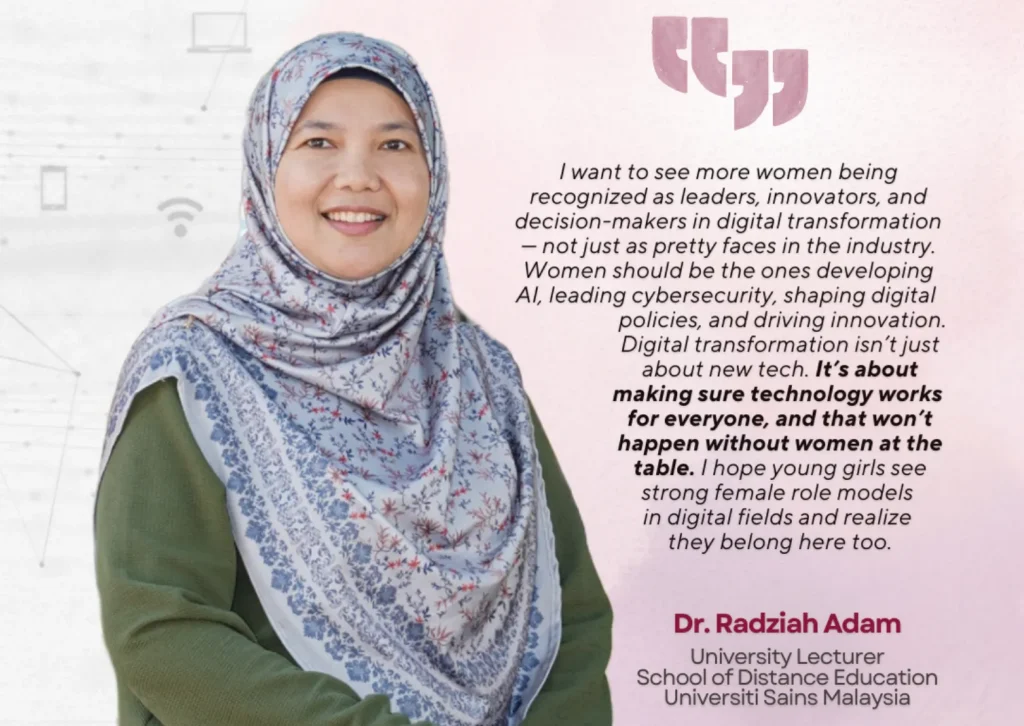
Dr. Radziah Adam serves as the USM Coordinator for the Nuffic’s European Mobility Programme for Myanmar (EMPM) for Virtual Global Opportunities and Coordinator for the Micro-credentials@USM School of Distance Education (SDE), Dr. Adam plays a vital role in advancing digital transformation and education accessibility. In her capacity as a key contributor to MICROCASA, she focuses on expanding the impact of micro-credentials in Higher Education and Vocational Education and Training (VET). Her expertise in digital transformation strengthens MICROCASA’s outreach, ensuring sustained professional discourse and market-ready strategies for micro-credentials, fostering innovation and excellence in global education.
The huge gaps in the different generations’ online communication behaviors made Dr. Adam realize the value of modernizing communication strategies and blending social media platforms for maximum impact and engagement. Dr. Adam advises women, who are looking to build careers in digital transformation, to leverage digital media to their advantage—to write about trends in digital transformation, create short videos explaining tech concepts, or network with professionals globally. For Dr. Adam, the world needs more women not just joining the conversation, but leading it.
The University of the Philippines Office of the Vice President for Digital Transformation (OVPDx) ran this online campaign throughout March 2025 to celebrate exceptional women who are shaping the future of technology and innovation in the Philippines.
###
Follow the OVPDx Facebook page for updates on the office’s whereabouts.


